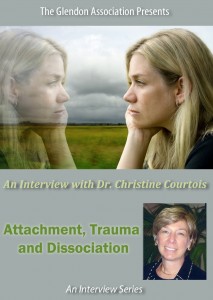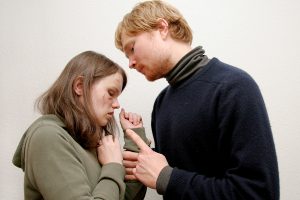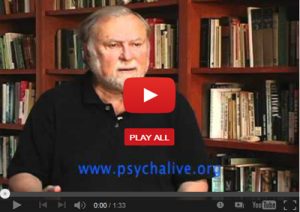Dr. Christine Courtois on Violence: VIDEO
Dr. Christine Courtois talks about her perspective on working with clients in relation to violence.
The following transcript contains part of an exclusive interview with Dr. Lisa Firestone and Dr. Christine Courtois.
LF In working with people who have been violent, what do you think is the most important thing in terms of treatment just from your perspective?
CC OK. Talking broadly I think, I would really want to look at their capacity for empathy and what I’ve found – and I don’t treat violent folks or perpetrators per se, but I think what’s absent is their ability to empathize and to know that they have had a profound impact on someone. And so I would want to be building that capacity. I would also want to be working against their denial and their cognitive distortions that really support whatever they do. And as we’re talking about dissociation, I would really want to be assessing their dissociativity. And the degree to which they were dissociative and how that might impact – of course, we would want to know what the history is. But that said, we also know that the highest – a high percentage of folks who are violent were themselves abused and hurt in some way. So I would want to be careful about that and recognizing that and probably start with looking at the person’s capacity to empathize and their own rationalizations before moving into working with their own history.
Frank Putnam’s work years ago and then he repeated it by looking at community violence – very chronic community violence – which of course is often on top of family violence and family abuse. But, what he found when he was first looking at DID is that DID women end up in the mental health system DID men often end up in the criminal justice system. And the DID women are – tend to be more acting in and acting against themselves while the men may be more externalizing and acting out against other people. So there seem to be some of those kind of gender differences that, that play out.
Order the Full DVD Interview:
 Attachment, Trauma and Dissociation
Attachment, Trauma and Dissociation
In this DVD, Dr. Christine Courtois draws upon her expertise in the field of trauma to discuss a variety of trauma related topics. She begins by talking about her work with survivors of childhood trauma, including the roles of attachment and dissociation. Dr. Courtois discusses the concept of the ‘Critical Inner Voice’ and Voice Therapy. She addresses how families can be a source of trauma, citing that statistically speaking “the most dangerous people to children are their intimates.” Dr. Courtois places an important emphasis on the extent to which individuals often minimize complex trauma, essentially saying of their abuse “Aw, it wasn’t so bad.” She discusses trauma bonding, repetition of trauma, and the treatment of violent individuals. Finally, Dr. Courtois offers some optimal parenting strategies “to promote the child’s self esteem” including building resilience and repairing negative experiences so that the child feels responded to and cared about.
Read More from Dr. Christine Courtois
 Christine A. Courtois, PhD, ABPP is a Psychologist in independent practice in Washington, DC where she is the principal of Courtois & Associates, PC. She received her PhD from the University of Maryland in College Park, in 1979. Dr. Courtois is immediate Past-President of Division 56 (Psychological Trauma) of the American Psychological Association and has recently published a revision of Healing the Incest Wound: Adult Survivors in Therapy (2010, 1988) and Treating Complex Traumatic Stress Disorders: An Evidence-Based Guide (2009) co-edited with Dr. Julian Ford. Her new book, The Treatment of Complex Trauma: A Sequenced, Relationship-Based Approach, co-authored with Dr. Ford, will be published by Guilford later this year. She is currently co-editing another book with him on the treatment of complex traumatic stress disorders in children (Guilford) and co-editing a book with Drs. Donald Walker and Jamie Aten on trauma and spirituality (American Psychological Association Books) to be published in 2013. She has authored two other books,Recollections of Sexual Abuse: Treatment Principles and Guidelines (1999) and Adult Survivors of Child Sexual Abuse: A Workshop Model (1993). Dr. Courtois has published numerous articles and chapters on related topics. She is a Founding Associate Editor of the new APA Division 56 journal, Psychological Trauma: Theory, Research, Practice, & Policy. She is Co-Founder (in 1990, with Joan Turkus, MD) of The CENTER: Posttraumatic Disorders Program, Washington, DC where she served as Clinical and Training Director for 16 years.
Christine A. Courtois, PhD, ABPP is a Psychologist in independent practice in Washington, DC where she is the principal of Courtois & Associates, PC. She received her PhD from the University of Maryland in College Park, in 1979. Dr. Courtois is immediate Past-President of Division 56 (Psychological Trauma) of the American Psychological Association and has recently published a revision of Healing the Incest Wound: Adult Survivors in Therapy (2010, 1988) and Treating Complex Traumatic Stress Disorders: An Evidence-Based Guide (2009) co-edited with Dr. Julian Ford. Her new book, The Treatment of Complex Trauma: A Sequenced, Relationship-Based Approach, co-authored with Dr. Ford, will be published by Guilford later this year. She is currently co-editing another book with him on the treatment of complex traumatic stress disorders in children (Guilford) and co-editing a book with Drs. Donald Walker and Jamie Aten on trauma and spirituality (American Psychological Association Books) to be published in 2013. She has authored two other books,Recollections of Sexual Abuse: Treatment Principles and Guidelines (1999) and Adult Survivors of Child Sexual Abuse: A Workshop Model (1993). Dr. Courtois has published numerous articles and chapters on related topics. She is a Founding Associate Editor of the new APA Division 56 journal, Psychological Trauma: Theory, Research, Practice, & Policy. She is Co-Founder (in 1990, with Joan Turkus, MD) of The CENTER: Posttraumatic Disorders Program, Washington, DC where she served as Clinical and Training Director for 16 years.










Leave a Reply